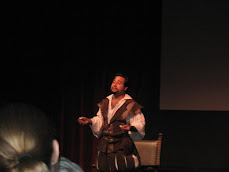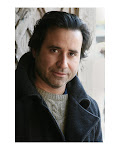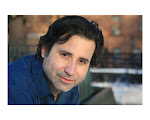NY Theatre Archive
2002-03 Theatre Season Reviews: O Jerusalem
From: NY Theatre Online: NY Theatre Archive
Date: March 20, 2003
Author: Aaron Leichter
We are a nation in search of answers. Our leaders act cocksure and other countries revile their overconfidence. But we ordinary citizens, switching channels between a barrage of embedded reporters and the usual junk food of sitcoms and reality shows as we brood on that thought that if it happened once, it will happen again, we ordinary citizens want answers and may fear that there are none. Theatre can no more answer our questions than television, but it can phrase them so that we ourselves can begin to. For most of O Jerusalem, now at the Flea Theater in Tribeca, A.R. Gurney inquires into the nature of the politics of the Middle East, in a manner at once simple and complex, spurring the audience to think carefully about global politics. But in the last scenes, he mewls platitudes. Because of this failure of nerve, O Jerusalem is a thudding disappointment.
Set in some Vonnegut-style future, where a book-length essay called "O Jerusalem" has transformed the world into a utopia, the play flashes back to the summer and fall of 2001 and the events that led to the revolutionary book. Gurney parodies the discursive structure of many nonfiction adaptations by relating events through a talky chorus. The actors break character and skip scenes. Within the action itself, O Jerusalem is a kind of postmodern Shaw play, where people argue as if their lives depend on it because their lives do depend on it: it’s discussion as action.
In the play-within-a-play, Hartwell (Stephen Rowe), a self-centered mid-level American diplomat in the Middle East, meets an old flame, a Christian Palestinian idealist named Amira (the superb Rita Wolf). Her son has heard rumors of a large-scale terrorist action still in the planning stages, an attack by air somewhere on the US eastern seaboard. Hartwell desperately tries to pass this grain of intelligence on to his superiors, but the State Department won’t listen, the White House won’t listen, the CIA won’t listen, even another ex-lover, Sally (Priscilla Shanks) won’t listen. When the towers fall, he steals away to a New England cabin to write out his thoughts. Those writings are the ideas that will change the world.
It’s these post-9/11 scenes that sink the show. Hartwell’s obsession for blowing the whistle on the calcified American policy doesn’t track with his earlier character, while his conversion to activism lacks a basic dramatic foundation. Most damningly, his ultimate
message—and the play’s—is ridiculous and simplistic: “We’re all in this thing together.” Beware political plays that can be summed up in one sentence.
The impression given is that Gurney didn’t polish his play past a rough draft. Small plot holes and extraneous information—why is Amira a Christian Palestinian?—don’t ladder the play’s fabric until the final scenes tear it apart. O Jerusalem provokes frustration because it could’ve been so much more. Despite his occasional sloppiness, Gurney goes further than the authors of other political plays running Off-Broadway today in teasing out the horrifying complexity of the present situation. He makes some very good points about how water rights are as important as oil rights in the Middle Eastern deserts. And the triangle of Amira-Hartwell-Sally gives the play a sexy edge that dramatizes the intellectual subject matter (it’s worth mentioning that Gurney’s previous plays have tended to be wry dramas populated by mandarins; here, the politics give the relationships a welcome heft).
For their part, director Jim Simpson and his design team approach the script playfully by stripping the stage to essential elements: locations are suggested through large photographs on easels; only a few props appear onstage. A LED strip, like the newsribbons in Times Square, announces the date of each new scene, adding suspense as the play moves closer to September 2001 and then past it. Clever references to the past bring the play alive in the present (as opposed to the future where it’s set): to show Hartwell’s stops in the Mediterranean, the Chorus refers to a map of the Roman Empire.
And throughout, there’s an ad hoc quality to the ensemble’s performances. Actors-playing-actors-playing-characters directly address the audience with hilarious effect, filling latecomers in on what they’ve missed. Chaz Mena, as one of the pair of choral members who plays several roles, steals the play in a great scene as an Israeli cabbie who can’t help arguing with Amira. Their interaction, both in dialogue and in performance, captures the nuances of the Israeli-Palestinian bond of fraternal hatred: when she hears that her son has been killed, it is this minor character who comforts her.
O Jerusalem has several such scenes that are both dramatic and intellectual, that raise as many questions as they answer. And through most of the play, Gurney uses a deft theatrical touch. But his ending squanders the goodwill that he’s built up. Audiences may remember the first hour and a quarter, or they may recall the last fifteen minutes. Their reactions will rest on which of those two sections lingers most in their minds.





















No comments:
Post a Comment